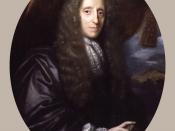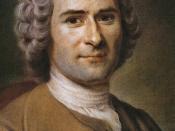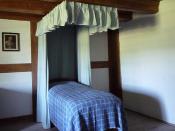John Locke and Jean-Jacques Rousseau are great political philosophers that have many similar insights about society and its political form. However, when closely examining the writings of these thinkers, one can easily discover many subtle differences among them. The two philosophers base their theories on different assumptions, which subsequently lead to dissimilar ideas about the origin of society and the constitution of governments. As a result, their views of the development of society greatly dissent from each other. Locke's and Rousseau's different versions in the development of society cause them to reach disparate conclusions concerning the legislative power, social unit, and revolution rights of the society. Locke believes that the government holds the legislative power, society as individual units, and the people have the right to overthrow the legislator; Rousseau believes that the people have the legislative power, society conforms as a general will, and the people have no right to revolt against the legislator.
Despite the similarities between Locke and Rousseau, their theories of the state of nature already differ in terms of morality, property, and freedom. Locke believes that men are born with morality ingrained in them; Rousseau states that men are born with no morality, and only follow their instinct and appetite. He claims that in the state of nature, "His [Man's] first law is to see to his preservation" (), clearly indicating the lack of morality in people.
Locke states that property is a natural right and can be acquired by labor; Rousseau, on the other hand, states that in the state of nature, men do not own property. Finally, Locke claims that in the state of nature, men have freedom and liberty. In opposition, Rousseau states that even in the state of nature, men are slaves of their own desires. He proposes that it is...


